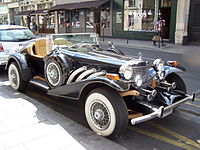
Used Vehicles and the Environment
There is perhaps no greater symbol for man's relationship with the environment than that of the oilrig. The fact is, Americans are addicted to oil, along with the rest of the world. We use it for heating, energy, transportation, plastic, and a host of other necessities that make up nearly every part of modern life. So why would be used cars be an environmental boon?
Hybrids
Many people look at the environmental crisis and are driven to buy a hybrid. These autos require less gasoline to operate because they also utilize electric batteries. However, most of them take an enormous amount of energy to build – on some estimates, in the neighborhood of one hundred million BTUs of energy, about the same as one thousand gallons of gasoline. That means that every new hybrid on the market has already driven the equivalent of nearly 50,000 miles or more, when you compare BTU usage.
Additionally, hybrids cause some serious problems when it comes to emissions. These vehicles run off of two engines, which raises production costs through the roof in terms of air quality. Plus, electric batteries are filled with dangerous chemicals, many of which are strip-mined in areas with less stringent environmental policies than the United States, a classic example of shifting-the-burden. It is estimated that many hybrids actually leave the environment worse off due to the material cost of transporting heavy batteries across the ocean on tankers. And, while plug-in autos sound like a good idea, the electricity used to power them comes from a coal plant, which can cause more pollution than gasoline, in the long run.
The Manufacturing Process
When considering the environmental impact of a car purchase, MPG is typically the first condition to come to mind. This is not an altogether misguided move, as the more efficient the car is, the less energy it will expend and the fewer pollutants it will release into the atmosphere. However, every new car takes energy to produce. This is true of traditional SUVs, plug-in electric vehicles, and hybrids.
Used Autos
Used cars, on the other hand, have already been produced, so they don't add any new burden on the environment. This, of course, is especially true for well-maintained vehicles that already have great gas mileage. The environmental savings from buying a compact car with an MPG of around 35, for example, is immense. Many recent studies have shown that used cars are often a better environmental investment than a new hybrid, due simply to the lack of manufacturing cost and the efficiency of many late 90s and early 2000s commuter vehicles. At the end of the day, the rust bucket might win out over the shiny new hybrid, even with all the marketing in the world.
Proudly WWW.PONIREVO.COM
by Ace Abbey



